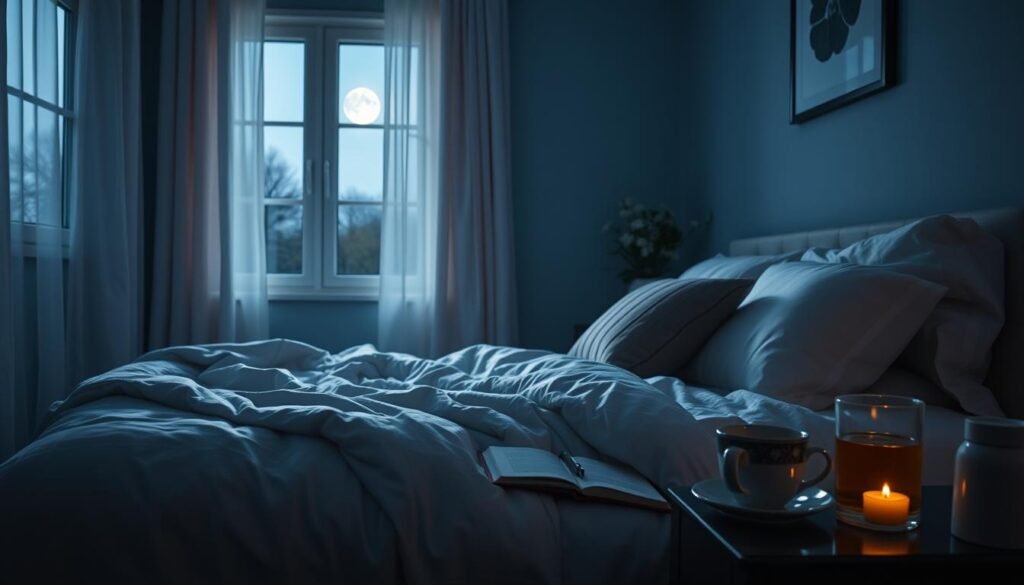About 2% to 3.5% of people deal with Obsessive-Compulsive Disorder (OCD). This condition is often linked with trouble sleeping. Those with OCD usually have a hard time getting good sleep. They feel it more deeply than tests might show. This connection between OCD and insomnia is important. If ignored, it can lead to chronic insomnia. Chronic insomnia means sleep problems that happen at least three times a week for more than three months. Not sleeping well not only affects your sleep health. It can also lead to serious health issues like heart disease and diabetes. In this article, we’ll look at effective ways to treat OCD insomnia. These methods can help you sleep better and improve your mental health.
Key Takeaways
- The lifetime prevalence of OCD is between 2% and 3.5%.
- Many OCD patients experience significant sleep disturbances.
- Chronic insomnia increases the risk for serious health conditions.
- Effective treatment often combines therapy, medication, and lifestyle changes.
- Natural aids like melatonin can help regulate sleep patterns.
- Improving sleep hygiene can lead to better sleep quality.
Understanding the Connection Between OCD and Insomnia
There’s a significant link between Obsessive-Compulsive Disorder (OCD) and insomnia, affecting mental health. About 2.5 million American adults have OCD. This is around 1.2% of the population. People with OCD have a sevenfold increase in the risk of insomnia.
About 42% of those with OCD struggle with insomnia. This issue needs more attention.
Those with OCD often deal with sleep disturbances. These issues can worsen their symptoms. They usually have trouble sleeping well and often wake up during the night.
This problem between OCD and insomnia can become a cycle. Anxiety and intrusive thoughts make sleeping hard. This can make insomnia even worse, harming their mental health.
- Higher rates of insomnia among individuals with severe anxiety and depression have been documented.
- Many participants in studies demonstrated reduced sleep latency and duration.
- Those with OCD often see a higher prevalence of delayed sleep phase disorder.
It’s important to manage both OCD and sleeping problems. Keeping a regular sleep schedule can help a lot. Also, treatments like exposure and response prevention therapy (ERP) can improve sleep and health by managing OCD symptoms.
How OCD Symptoms Impact Sleep Quality
People with OCD often notice their sleep quality gets worse. Almost half of those with the disorder have trouble sleeping. They find it hard to fall asleep or wake up often during the night.
Nighttime makes OCD thoughts worse because there are fewer distractions. This makes people anxious and keeps their minds active. Also, compulsions can disrupt sleep by making individuals feel they need to do something right away.
Those with OCD usually don’t sleep as well as others. A condition called delayed sleep phase disorder (DSPD) is common among them. It affects between 17.6% to 42% of OCD patients, which is a lot more than in the general public. People with DSPD and OCD find their symptoms harder to manage, which affects their sleep.
OCD and lack of sleep can make each other worse. Not getting enough sleep makes OCD symptoms more intense. At the same time, OCD thoughts and actions make it hard to sleep well. Improving sleep can help make OCD easier to handle.
For more information on how OCD affects sleep, see OCD and sleep quality in health literature.
OCD Insomnia Treatment: Why It’s Important to Address Both Conditions
Treating insomnia along with OCD is key for better mental health and sleep. About 48% of people with OCD struggle to sleep well. This shows how linked the two issues are. Treating one but not the other can slow down recovery.
OCD sufferers often sleep less and wake up more than those without it. This makes it crucial to treat both problems together. CBT, with ERP, is crucial for OCD. Adding treatments for insomnia can improve results.
Here are ways to sleep better:
- Knowing your sleep habits
- Keeping a regular sleep schedule
- Having a relaxing routine before bed
- Handling OCD symptoms that harm sleep
Choosing the right treatment mix helps find long-term solutions. Combining treatments improves overall health, according to research. For tough cases, medicines might help too. This ensures all mental health aspects are covered.
Understanding how OCD and insomnia are linked helps experts make full treatment plans. This approach greatly benefits patients, leading to better mental health and life quality.
| Condition | Impact on Sleep | Treatment Considerations |
|---|---|---|
| OCD | Shortens total sleep time, increases awakenings | Cognitive Behavioral Therapy, SSRIs |
| Insomnia | Difficulty falling/staying asleep | Sleep hygiene practices, CBT |
| Dual Diagnosis | Compounding factors leading to increased distress | Integrated treatment plans |
Cognitive Behavioral Therapy (CBT) for Insomnia
Cognitive behavioral therapy is a top choice for treating insomnia, particularly when OCD is involved. It changes negative thinking and actions that disrupt sleep. CBT tackles both the mind and behavior to fight insomnia and boost sleep quality.
The Cognitive Component of CBT
In CBT, the focus is on fixing false thought patterns that make sleeping hard. People learn to swap worry-filled thoughts about sleep with positive ones. About one-third to half of adults struggle with sleep, often due to these mistaken beliefs. Changing these thoughts is key in CBT for managing OCD-related insomnia.
The Behavioral Component of CBT
The behavior part of CBT aims to create good sleep habits. Using methods like sleep restriction, people can build healthier sleep routines. CBT-i, a version for insomnia, can shorten the time it takes to fall asleep by 19 minutes. It also adds about 8 minutes of sleep time. CBT-i works as well as sleep meds but is safer, making it an excellent choice for treating insomnia. More on insomnia treatment here.

| Aspect | Before CBT | After CBT |
|---|---|---|
| Average Sleep Latency | Varies | Reduction of 19 minutes |
| Time Awake After Sleep Onset | Varies | Reduction of 26 minutes |
| Total Sleep Time | Varies | Increase of 8 minutes |
| Sleep Efficiency | Varies | Improvement by 10% |
CBT is powerful for treating insomnia and aids in handling OCD symptoms too. Its holistic approach plays a crucial part in long-term wellness.
Sleep Hygiene Practices to Enhance Sleep Quality
Maintaining good sleep hygiene is key, especially for those with insomnia and OCD. Effective strategies can greatly improve sleep quality. This involves creating a cozy place to sleep and keeping a regular bedtime.
Creating a Comfortable Sleep Environment
A comfy place to sleep is crucial for better sleep hygiene. Several things help make a restful space:
- Minimize Noise: Use earplugs or white noise machines for a quieter room.
- Control Light Levels: Blackout curtains help make the room darker.
- Select Appropriate Bedding: Pick a mattress and pillows that feel right for you.
- Maintain Optimal Temperature: Keep your bedroom cool and comfy for sleeping.
Establishing a Consistent Sleep Schedule
Sticking to a regular sleep schedule helps set your body’s clock. A routine can improve sleep hygiene by telling your body when it’s time to wind down. Here are ways to keep a steady schedule:
- Set Regular Bedtime and Wake-up Times: Sleep and get up at the same time daily, even on weekends.
- Avoid Napping Late in the Day: Keep naps short and early so they don’t affect your night sleep.
- Develop a Pre-Sleep Routine: Do relaxing activities before bed, like reading or relaxation exercises.
Using these strategies for a better sleep space and schedule can boost sleep hygiene. This can lead to improved mental health and less insomnia.
Exploring Relaxation Techniques for Better Sleep
Relaxation techniques can make a big difference in how well you sleep, especially if you have insomnia or OCD. By practicing meditation, mindfulness, or controlled breathing, you can lower your stress. This makes it easier to start sleeping and improves your overall health.
Meditation and Mindfulness
Meditation and mindfulness are now widespread ways to relax. They help you pay attention to the now, without judging your thoughts. Studies show that these methods greatly reduce anxiety and stress. By meditating for just ten minutes a day, you can handle emotions better and sleep well.
Breathing Exercises and Muscle Relaxation
Breathing slowly and deeply can help you feel more relaxed. This is because it encourages you to breathe in a controlled way. Progressive Muscle Relaxation (PMR) requires you to tighten and then relax your muscles. Doing these exercises regularly, twice a day, can improve how you handle sleep issues.

| Relaxation Technique | Description | Frequency for Best Results |
|---|---|---|
| Meditation | Focus on the present moment, allowing thoughts to pass without judgment. | Daily, for at least 10 minutes |
| Mindfulness | Objective awareness of current experiences, enhancing emotional regulation. | Integrated into daily activities |
| Breathing Exercises | Controlled breathing to foster relaxation and reduce anxiety. | During challenging moments or as a daily practice |
| Progressive Muscle Relaxation | Tensing and relaxing muscle groups to relieve tension. | Regularly, suggested twice a day |
Exposure Therapy: Facing Sleep-Related Fears
Exposure therapy is highly effective for OCD, especially for managing fears about sleep. It helps people face their fears directly. This can greatly improve their chances of sleeping well.
Somniphobia is a common fear. It’s an intense worry about falling asleep. This fear can make insomnia worse. People might delay going to bed or start rituals to feel safer. Exposure therapy teaches them to confront these fears. This helps them move past the short-term fixes of avoiding the problem.
- Many feel a lot of worry about sleep during the day.
- Problems focusing and carrying out rituals to ease sleep anxiety are common.
- This fear might come from past sleepless nights, disturbing dreams, or stress over tasks.
A therapist in exposure therapy starts with lesser fears, building to the bigger ones. They help clients face their sleep-related fears step by step. This method teaches coping skills. It also helps clients stop relying on behaviors that only help briefly.
Relaxation techniques are also used. They help bring on a relaxed state. This relaxation can help fight the tension and worry that fear brings. It makes people feel better about sleeping.
Studies show that exposure therapy is very successful. More than 90% of patients beat their specific fears. For those whose insomnia is worsened by fears about sleep, this therapy can greatly improve their life. Exposure therapy lets individuals address and manage these fears. It leads to better sleep over time.
The Role of Medication Management in Treating OCD and Insomnia
Managing medications is key in treating OCD and insomnia. It can greatly improve how people with these conditions function every day. There are many drugs aimed at specific symptoms. This gives hope to those looking for relief.
Types of Medications for OCD
OCD is often treated with SSRIs. Some well-known SSRIs are:
- Fluoxetine
- Paroxetine
- Sertraline
- Fluvoxamine
- Citalopram
- Escitalopram
SSRIs can help balance mood and lessen unwanted thoughts. This aids in managing medications effectively. Sometimes, using atypical antipsychotics with SSRIs can improve results. This helps those who don’t respond fully to SSRIs.

Medications for Insomnia
Medicines for insomnia include:
- Zolpidem
- Eszopiclone
These drugs are designed to help start and improve sleep. This is especially important for those dealing with both OCD and insomnia. It’s crucial to manage medications carefully. Doing so can make a big difference in treatment success.
While managing medications is important, it sometimes takes months to see big improvements. If symptoms persist, combining drugs with therapy like CBT may be needed. This team approach can provide a more rounded treatment for those facing the challenges of OCD and insomnia.
Integrating Treatment Plans for Long-Term Relief
To get long-term relief from OCD and insomnia, a full plan is needed. This includes therapy, medicine, and changes in daily life that fit the person. Each part aids in tackling the condition fully.
Working with doctors and therapists is key. It helps make a plan that’s just for you, making treatment better. Choices might be therapy like CBT or medicines called SSRIs. These have helped many people.
It’s vital to see if the treatment works over time. Changing the plan when needed is part of getting better. New methods like exposure therapy and virtual reality are changing treatment. They make it more fun and work better.
Making life changes is also important. Things like better sleep, exercise, and eating right support treatment. Adding omega-3 fats to your diet or meditating can lower stress and boost health.
Choosing an integrated treatment plan with regular updates is crucial for lasting long-term relief. Being involved in your care makes you more committed to getting better.
Conclusion
Finding the right treatment for OCD insomnia is vital for better mental health. There’s a clear connection between obsessive-compulsive disorder and sleeping problems. This highlights the need for well-rounded recovery methods.
Using therapy, meds, and lifestyle changes can help people get better sleep. This boosts their overall health.
Studies show many with OCD also can’t sleep well, which makes treatment harder. Knowing how sleep problems make OCD worse helps with finding the right help. Programs like the Bergen 4-day treatment have been very helpful for a lot of patients.
Strong support and various treatments can make life a lot better for those with OCD and insomnia. It’s crucial for people to get help and use effective treatments. Being proactive about mental health leads to lasting recovery and peaceful sleep.